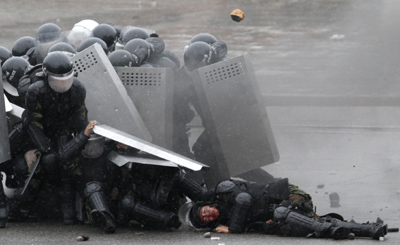History seemed to repeat itself this week in the mountainous Central Asian nation of Kyrgyzstan. For the second time in five years, angry protesters—ignored and suppressed by a corrupt government—ousted yet another president.
In March 2005, Kyrgyz citizens protested against widespread corruption, stolen parliamentary elections, and nepotism in the administration of President Askar Akayev. He had to flee the country for Russia after the capital, Bishkek, fell into the hands of the opposition and violence erupted outside his office. As a result of the uprising, dubbed the Tulip Revolution, one of the opposition leaders, Kurmanbek Bakiyev, was installed as a new president of a democratic Kyrgyzstan.
Showing his allegiance to democratic rule, Bakiyev publicly declared he would protect human rights and civil freedom, fight government corruption, and oppose authoritarianism. He also promised to support press freedom and transform the state-owned broadcasting service into an independent public outlet. But on Wednesday Bakiyev was deposed by some of the same protesters who brought him to power, undone by his administration’s failures to follow through on democratic reforms.
Protests and opposition rallies preceded this new uprising. As in 2005, public discontent was focused on increasing government corruption, installment of the president’s relatives in government positions, politicized arrests of opposition leaders, and rising energy bills. Independent local and regional press widely covered these issues, scrutinized Bakiyev’s policies, and published protesters’ demands in detail. But instead of addressing the boiling issues, and trying to avert the crisis, which left dozens dead and hundreds wounded, Kyrgyz officials retaliated against the messengers.
As in 2005, Kyrgyz prosecutors and its media regulator filed charges against journalists, suspended news outlets, and blocked access to a number of print, broadcasting, and Web-based media outlets—giving yet another reason for public anger.
In early March, ahead of the fifth anniversary of Bakiyev’s ascent to power, Kyrgyz authorities pressured private radio and television stations to stop carrying programming from the Kyrgyz service of the U.S. government-funded Radio Free Europe/Radio Liberty (
As if unsatisfied by the crackdown, on March 18 a Bishkek court suspended the pro-opposition newspapers Achyk Sayasat and Nazar, which in the view of Kyrgyz prosecutors insulted Bakiyev’s dignity by publishing an article written by an exiled opposition activist. Prosecutors also demanded that the newspapers each pay damages of 5 million Kyrgyz som (US$112,000)—a sum that threatened the newspapers’ existence, broadened the already widespread self-censorship among journalists, and infuriated protesters.
Alarmed by the crackdown, CPJ urged Bakiyev to stand by his commitment to press freedom and reverse repressive actions against his critics. But his government ignored the call, and his officials targeted two other independent outlets—the Bishkek-based newspaper Forum and the Web-based television channel Stan TV. A district court in Bishkek suspended Forum on charges of inciting change in the constitutional order, while financial police effectively took Stan TV off air by raiding its newsroom, confiscating equipment, and sealing its offices. Talking to Reuters after the raid, Stan TV General Director Ilya Sivokhin said police officers did not produce a warrant or say who ordered the action. Sivokhin believed it was government retaliation for Stan TV “reports about the opposition, for our reporting about what is really happening in the country.”
UN Secretary General Ban Ki-moon, who visited Kyrgyzstan April 3, also condemned the crackdown and urged Bakiyev and his government to respect human rights and protect media freedom. “Quite frankly, recent events have been troubling, including those of the past few days. As I told the president, all human rights must be protected. That includes free speech and freedom of the media,” the secretary general said in his address to the Kyrgyz parliament.
But the administration was on a different path. Ferghana reported that authorities, as they did in 2005, arrested opposition leaders and sent police to disperse protesters in the regions. And once again, infuriated, unheard, and left without their leaders, crowds appeared on the streets of Bishkek, where they were further enraged and frightened by troops and police firing live ammunition at civilians.
What followed has been widely reported, both in 2005 and today. Parliament, the Interior Ministry, the prosecutor general’s office, and the headquarters of the National Security Service—as well as businesses in Bishkek run by innocent shopkeepers—fell into the hands of angry and uncontrolled mobs, which looted them and set them afire. Bakiyev, whose house was reportedly looted and torched as well, fled the capital much like the predecessor whom he so fiercely opposed.
While opposition leaders are now trying to restore order, divide government seats, and mourn the dead, previously shuttered media outlets have reportedly resumed their work. Sources told CPJ that Ferghana is now accessible in the country, and
One hopes that whoever comes to power will learn to tolerate criticism and treat independent media as a pillar of democracy and not a threat to their government.
